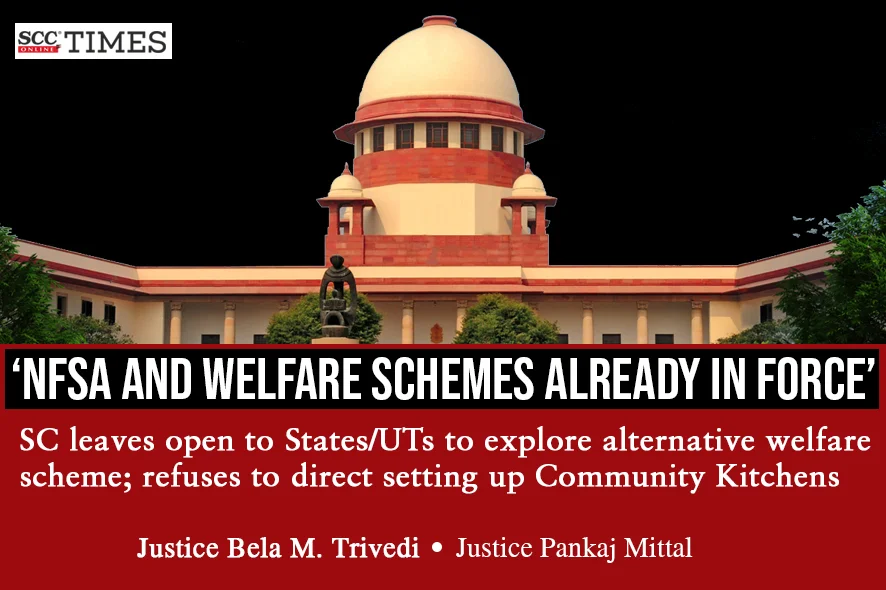Supreme Court: In a civil writ petition under Article 32 of the Constitution of India, the petitioners sought directions against the States and Union Territories to formulate scheme for community Kitchens, the Division Bench of Bela M. Trivedi* and Pankaj Mittal, JJ. refused to give any directions to the States or Union Territories for implementing the concept of community kitchen considering the National Food Security Act, 2013 and various schemes developed under it.
The petitioners had sought various directions from the Court for implementing the concept of community Kitchens to combat hunger, malnutrition and starvation and the deaths resulting thereof. The petitioners also sought direction against the National Legal Services Authority and the Central Government to create a National Food Grid beyond the scope of the Public Distribution Scheme.
The Court said that though the Constitution of India does not explicitly provide for ‘Right to food’, however, the fundamental Right to life under Article 21 of the Constitution does include right to live with human dignity and right to food and other basic necessities. The Court perused Article 47 of the Constitution which provides that the State shall regard the raising of level of nutrition and the standard of living of its people and the improvement of public health as among its primary duties.
The Court discussed about the enactment and the object of the National Food Security Act, 2013 (NFSA), which was formulated by the Parliament keeping in view the United Nation’s goal of eradicating extreme poverty, and Constitutional guarantees for ensuring food security, and improving the nutritional status of the people, especially of women and children. The Court said that the object of the NFSA is to provide for food and nutritional security in human life cycle approach, by ensuring access to adequate quantity of quality food at affordable prices to people to live a life with dignity. The Court also stated that with the enactment of the NFSA there was a paradigm shift in the approach to food security from welfare to rights-based approach. The Court also highlighted that the NFSA has been implemented in all States and Union Territories, with its guiding principles based on life cycle approach, wherein special provisions have been made for pregnant women and lactating mothers and children in the age group of 6 months to 14 years, by entitling them to receive nutritious meals free of cost, through a widespread network of Integrated Child Development Services (ICDS) centres, called Anganwadi centres under the ICDS schemes, and also through the schools under Mid-day Meal (MDM) scheme. Higher nutritional norms have also been prescribed for malnourished children.
The Court said that the Cash Transfer of Food Subsidy Rules 2015, (Rules) have also been framed in exercise of the powers conferred by Section 39(2)(d) read with Section 12(2)(h) of the NFSA. The Court also said that these Rules have empowered the State Governments to implement the scheme with the approval of the Central Government to provide food subsidy in cash directly into the bank accounts of entitled households to purchase the quantity of food grains from the open market.
Further, the Court said that there is a systematic legal framework provided under the NFSA for the implementation of the schemes and programmes like Targeted Public Distribution System, MDM Scheme, Integrated Child Development Services and Maternity Cash Entitlement along with a monitoring mechanism and a Grievance Redressal Mechanism, and the States/UTs having also implemented various other schemes and programmes under the said Act. The Court reiterated that the States cannot be directed to implement a particular policy or scheme on the ground that a better, fairer or wiser alternative is available. Legality of the policy, and not the wisdom or soundness of the policy, would be the subject of judicial review.
Therefore, the Court said that when NFSA with a ‘right based approach’ for providing food and nutritional security, along with other welfare schemes is already in force, to ensure access to adequate quantity of quality food at affordable prices to people to live a life with dignity, no further directions can be given in the matter. However, the Court said that the concept of Community Kitchens was not examined on the test that whether it is a better or wiser alternative available to the States to achieve the object of NFSA, rather it was left open to the States/UTs to explore such alternative welfare schemes as may be permissible under the NFSA.
[Anun Dhawan v. Union of India, 2024 SCC OnLine SC 179, Decided on: 22-02-2024]
*Judgment Authored by: Justice Bela M. Trivedi







